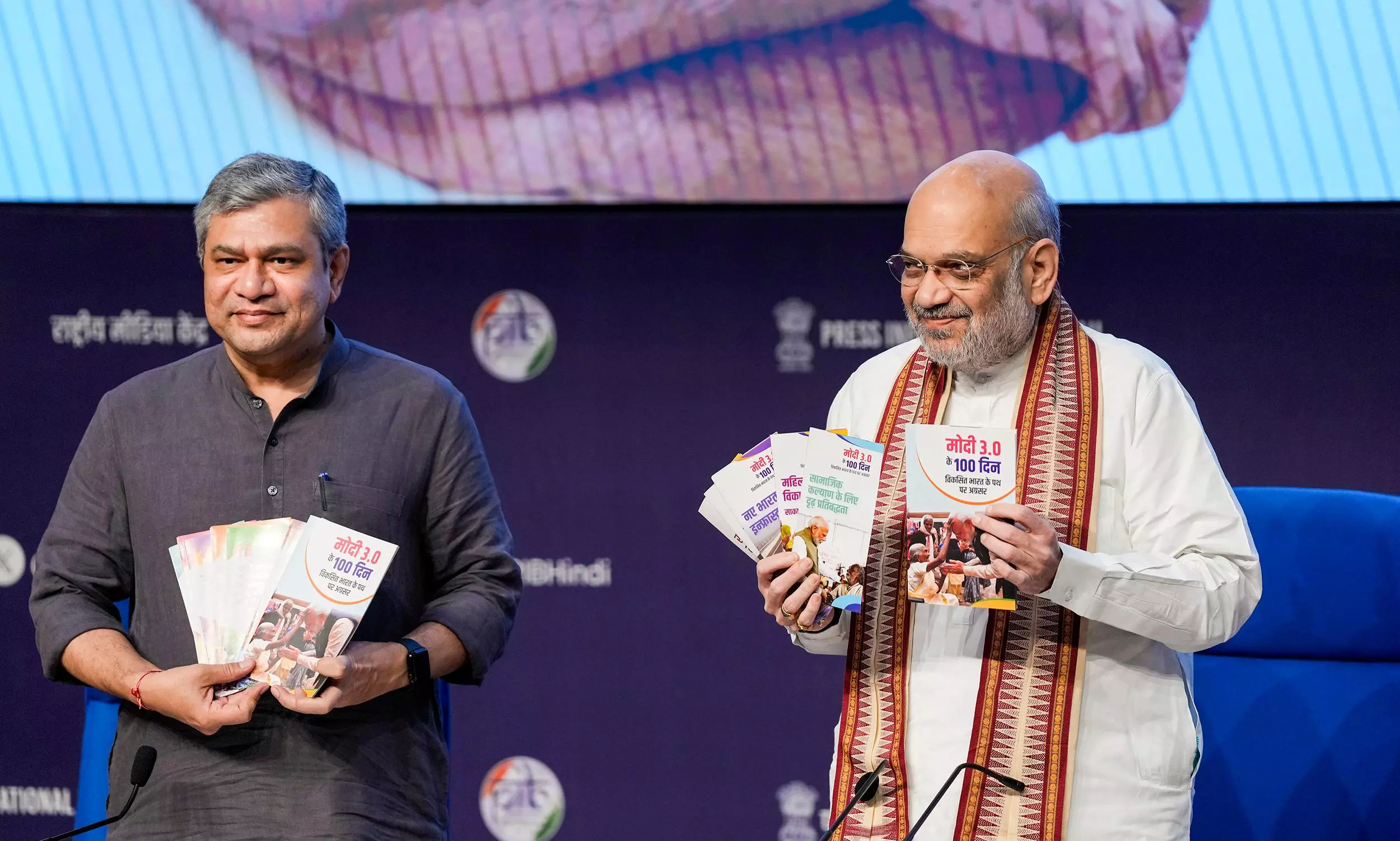
100 days of Modi 3.0: Amit Shah lists schemes initiated for middle class
Nods to Metro projects worth Rs 30,700 crore and 12 industrial corridors with an investment of Rs 28,600 crore among achievements of Modi 3.0 government

Union Home Minister Amit Shah has listed nods to Metro projects worth Rs 30,700 crore and 12 industrial corridors with an investment of Rs 28,600 crore as the achievements of the Narendra Modi government in the first 100 days of its third tenure.
Shah, flanked by Information and Broadcasting Minister Ashwini Vaishnaw, on Tuesday (September 17) listed the following schemes initiated to “empowering the middle class” by the Modi 3.0 government.
- The Public Examinations (Prevention of Unfair Means) Act has been implemented by the government for transparency in recruitment.
- Metro projects worth Rs 30,700 crore in Pune, Thane, and Bengaluru will enhance connectivity and reduce travel time, said Shah.
- The Fast Track Immigration-Trusted Traveller Programme (FTI-TTP) has been launched at Delhi’s IGI Airport to ensure hassle-free travel. Under the FTI-TTP, eligible passengers can utilise e-gates and bypass regular immigration queues for a seamless journey. They only need to apply online and submit their biometrics (fingerprint and facial image) along with other required information as specified in the application form.
- The government has declared income up to Rs 7 lakh as tax-free and started an increased standard deduction from Rs 50,000 to Rs 75,000. “A comprehensive review of the Income-tax Act was initiated to simplify it and make it people-friendly,” said Shah.
- Talking about the Unified Pension Scheme (UPS), the home minister said it will give an assured pension of 50 per cent of the average basic pay drawn over the past 12 months before superannuation.
- Revision of the “one rank, one pension” scheme will ensure the welfare of retired defence personnel and their families, said Shah.
- As many as 75,000 new medical seats will be available soon, which will reduce reliance on overseas institutions and improve the country’s healthcare infrastructure.
- On the Ayushman Bharat scheme, Shah said people aged above 70 will be given a health cover of Rs 5 lakh per year, irrespective of income, benefiting 6 crore senior citizens.
- One crore houses will be built under the Pradhan Mantri Awas Yojana (Urban) with a central government subsidy of Rs 2.30 lakh crore for urban housing development.
- Solar systems installed in 3.5 lakh houses under the PM Surya Ghar Muft Bijli Yojana will increase savings for the middle class, said Shah.
- The MUDRA loan limit has been doubled from Rs 10 lakh to Rs 20 lakh to boost entrepreneurship while customs duty on gold and silver was reduced to 6 per cent and on platinum to 6.4 per cent providing relief to the middle class.
- The government will also procure electric buses under the PM-eBus Sewa-Payment Security Mechanism with a support of Rs 3,400 crore, he said.
Congress claims
The Congress, on the other hand, has claimed that the first 100 days of Modi 3.0 were marked by a litany of U-turns and a series of scandals with the government yet again having “failed to act” on India’s “mass unemployment crisis”.
Congress general secretary in charge of communications Jairam Ramesh said “the non-biological PM and his drumbeating economists” have consistently attacked the idea of jobless growth but the reality of what has been seen since 2014 is perhaps even more stark — “job-loss growth”.
“Yesterday marked a hundred days of this unstable, crisis-ridden government. Amidst a litany of U-turns and a series of scandals, the government has yet again failed to act on India’s mass unemployment crisis — an issue which the Congress has been consistently sounding the alarm on for the past five years at least,” he said in a statement.
The crisis has been of the government’s own making, caused by the decimation of job-creating MSMEs through the “Tughlakian demonetisation”, a hastily-rushed-through GST, an unplanned COVID-19 lockdown and rising imports from China, Ramesh said.
“The final straw has been the non-biological PM’s economic policy of favouring large conglomerates. India’s unemployment rate today is the highest it has been in 45 years, with the unemployment rate for graduate youth at 42%,” he said.
(With agency inputs)

